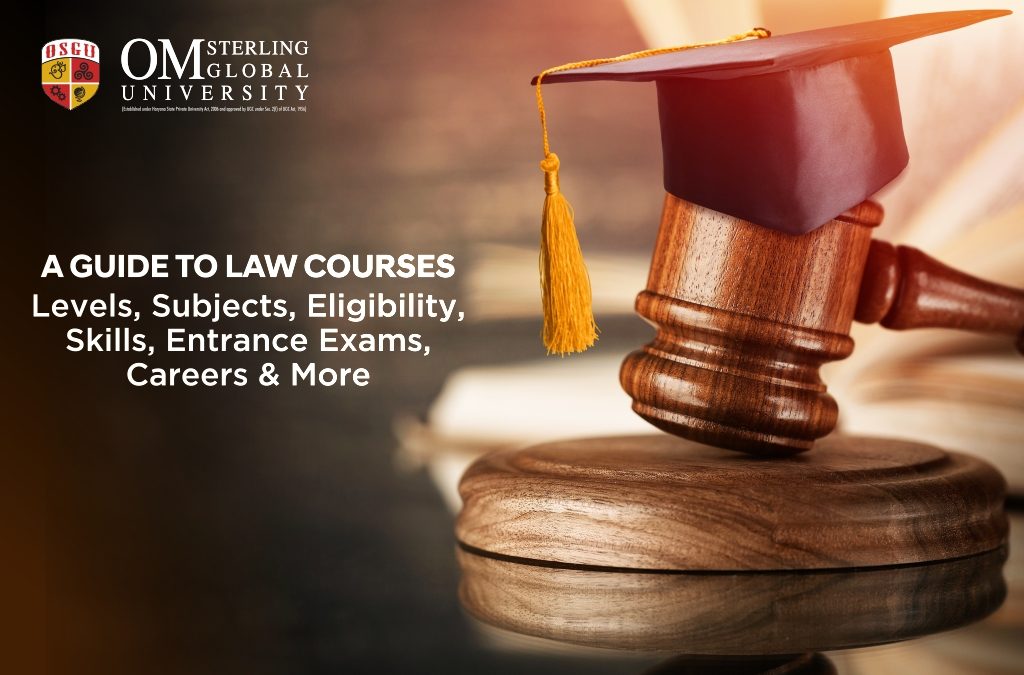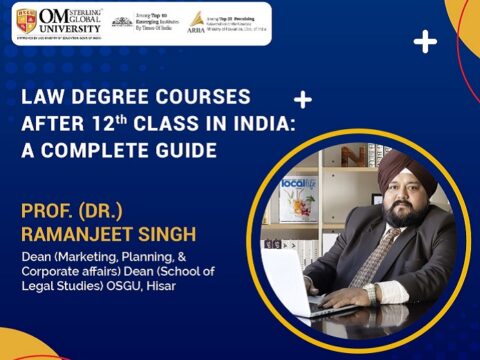-
Announcement : Admission Open Apply Now
 CONFERENCES 2026
CONFERENCES 2026  PhD. Admission 2026
PhD. Admission 2026 
A Guide to Law Courses: Levels, Subjects, Eligibility, Skills, Entrance Exams, Careers & More

Discover Yourself Health-Wealth happinesss
July 19, 2020
List of Best Courses After 12th for Commerce Students
August 1, 2020
A Guide to Law Courses - Subjects, Eligibility, Careers, Jobs, Benefits
Law And Legislature – Overview
No form of society can function without a system of Law and Order. Law is the fundamental requirement of any form of group or society, be it a private organisation or even a state or a country. Legislature is actually a set of rules and regulations with certain consequences if not followed or adhered.
Education is law is essential to become a person of system. There are opportunities opening up for new candidates in government as well as private sectors. Even when law and legislature is a great career choice, it is also the duty of the people of law to ensure that the system is running smoothly.
About Law Courses
A quality education in law has the potential to help the system get better and more efficient. To become a person of law, there is so much more required than just theory and the understanding of penal codes and applications. To become a part of the system, the aspirants need to be prepared for the profession in various ways through practice.
Law Courses: Types and Levels
For various levels and types of duties in the field of law, there are different courses as well. One can choose among the many courses whichever they feel suits them the best. The levels and types of law courses are given as follows:
1. Law Certificate Courses
There are short term courses that involve educating the candidate on a particular section of law. Such courses are generally referred to as certificate courses. The courses differ level-wise that can be taken before, during or after pursuing a basic degree or diploma in law. Some of the common certificate courses in law are as follows:
- Certificate Course on Liabilities Under Torts
- Certificate Course on Validity of Contracts
- Certificate Course on Enforcement of Fundamental Rights
- Certificate Course on Legal Provisions for the Protection of Women
- Certificate Course on Principles of Natural Justice
- Certificate Course on Indian Partnership Act
- Certificate Course on Negotiable Instruments Act
2. Law Diploma Courses
Diploma courses in law are pursued by not only the young and aspiring law individuals, but also by seniors and adults. A diploma is a precise and more of a primary course in law and legislature. Some of the common diploma courses are listed as follows:
- Diploma in Criminal Law
- Diploma in Business Law
- Diploma in Cyber Law
- Diploma in Human Rights
- Diploma in Criminology
- Diploma in Corporate Laws and Management
3. Law UG Courses
With an undergraduate course in law, the aspirants can become more than just a lawyer. There are plenty of variations that can be found in the specializations for the course. Some of such undergraduate programs in law are given as follows:
- LLB
- BA LLB
4. Law PG Courses
Law is a vastly spread field of education. There are multiple levels at which one can study law. As there are lower levels, there are postgraduate courses too. The generic ones among these courses are listed as follows:
- LLM – 1 year
- LLM – 2 years
5. Law Doctoral Courses
Doctorates in law are available and there is huge scope career as well as education wise in these programs. The doctorates that are available in law and legislature are listed as follows:
- Phil in Law
- D. in Law
Law Courses Eligibility Criteria
In order to pursue any course in law and legislature, the candidate needs to meet a set of eligibility criteria. These parameters are based on the curriculum and the outcome of the law program. The criteria differ for every level of course and become more and more precise as the level goes up.
1. Eligibility for Law Certificate & Diploma Courses
For certificate or diploma courses in law, there are eligibility criteria that are more than secondary education. A general set of criteria are listed as follows:
- The student must have passed at least 10th or 12th (depending on the course).
- They must have acquired at least 50% of the marks.
- For some of the certificate courses, background in law or law education is mandatory.
- Proof of education and identity are also essential.
2. Eligibility for Law UG Courses
The criteria to be eligible to apply for any law undergraduate course are more specific than those for lower level courses. The criteria for pursuing a law undergraduate course are listed as follows:
- The student must have passed 12th or an equivalent course, preferably in arts stream.
- They must have acquired at least 50% of the marks.
- Proof of education and identity are also essential.
3. Eligibility for Law PG Courses
The criteria that a candidate has to match to get into a post graduate program for law are more than just basic secondary education. These can also vary depending on the specialization that is being chosen by the student. Some of the common criteria are listed as follows:
- The student must have passed at least 12th in arts stream and graduation in a relevant field.
- Specialization in the graduation should form a base for the post-graduation specialization.
- They must have acquired at least 50% of the marks.
- Proof of education and identity are also essential.
4. Eligibility for Law Doctoral Courses
The eligibility criteria for doctoral courses are meticulous and selective. There are plenty of specializations for the doctorates as well. Some of the most common and fundamental requirements for a doctorate in law are listed as follows:
- The student must have passed at least 12th in arts stream and graduation and post-graduation in a relevant field.
- Specialization in the graduation and post-graduation should form a base for the doctoral program.
- A viable research project can aid the selection for the program.
- They must have acquired at least 50% of the marks.
- Proof of education and identity are also essential.
Law Courses Admission Process
There are plenty of law colleges in the country for which the admission process differs by a bit or a lot. Although, there are a few basic procedures without which the admission process is incomplete. In the below section, there are admission processes that are applicable to most law colleges in India and other countries.
1. Admission for Law Certificate & Diploma Courses
These are the basic and primary courses in the field of law. Normally, just the scores from the previous examination are enough and no entrance tests are needed here. A common admission procedure for diploma or certificate courses in law is given below:
- Start by researching for a suitable law college or institute.
- Check for the eligibility criteria.
- Enquire for the availability of admission, either online or offline.
- Fill out the admission form.
- Submit the required educational documents.
- Pay the needed fees for the course.
- Get the admission confirmed.
2. Admission for Law UG Courses
In the case of law undergraduate courses, an entrance may be involved which will also depend on the law college. There may be additional eligibility criteria to be met for a few of these courses as well. A general procedure for admission into an undergraduate program in law is as follows:
- Start by researching for a suitable law college or institute.
- Check for the eligibility criteria.
- Enquire for the availability of admission, either online or offline.
- Appear for an entrance exam, if required.
- Fill out the admission form.
- Submit the required educational documents.
- Pay the needed fees for the course.
- Get the admission confirmed.
3. Admission for Law PG Courses
To get admitted into a post-graduation course, there may be additional processes apart from the general eligibility criteria mentioned previously. A generic admission procedure to get an admission for a post-graduation course in law is as follows:
- Start by researching for a suitable law college or institute.
- Check for the eligibility criteria.
- Enquire for the availability of admission, either online or offline.
- Appear for an entrance exam, if required.
- Fill out the admission form.
- Submit the required educational documents.
- Submit a related project work, if asked.
- Pay the needed fees for the course.
- Get the admission confirmed.
4. Admission for Law Doctoral Courses
Doctorate admission do not generally work in the same manner as the admissions for lower levels of agricultural programs. There is a general procedure for these admissions and is given as follows:
- Start by researching for a suitable law college or institute.
- Check for the eligibility criteria.
- Enquire for the availability of admission, either online or offline.
- Appear for an entrance exam, if required.
- Fill out the admission form.
- Submit the required educational documents.
- Submit the research paper and include the developments thoroughly.
- Pay the needed fees for the course.
- Get the admission confirmed.
Salary After Law Courses
Well, law is a great choice of career for the youth and there sure is scope for further development and growth. Pursuing law is not as simple and requires dedication and determination. However, all of those efforts are worth it when the lawyer ends up with an impressive salary and impressive position.
Upon acquiring a diploma or a certificate course, the salaries will vary between ₹1,20,000 to ₹1,80,000 per annum. The salary can be more or less depending on the kind of job, the position or the organization where the candidate is employed.
With a graduate degree in law, the salaries can be comparatively more than diploma or certificate courses. The salaries will can range from ₹2,16,000 to ₹2,50,000 per annum. The packages will again vary depending on previously mentioned factors and others.
If the candidate has pursued a post graduate degree or completed their doctorate as well, the salary range will be high. The salaries can go from ₹3,50,000 to ₹4,50,000 per annum. However, in some cases, the starting salary can be as high as ₹5,00,000 to even ₹7,00,000 per year.
The number mentioned are an average and there can be differences practically. One thing for sure is that as the experience and education levels up, the salary will level up as well. There can be additional earning over the primary salary too if the firm has incentives and other benefits.
Career Option After Law Courses
There are numerous areas where law is an essential aspect. Even in areas that have even remotely to do with law also have been known to boost the career in the same. There are opportunities in government as well as the private sectors. Some of such are listed as follows:
- Advocate
- Judiciary
- Legal Advising
- Legal Research
- Legal Analytics
- Legal Outsourcing
- Government services
- Politics
- Civil Services
- Advocate in private firm
- Teaching
Also Read: Career in Law: Scope, Jobs & Salary – A Complete Guide
Job Opportunities After Law Courses
As stated in the previous section, there are plenty of areas in which a law individual can get employed. There is immense growth in the area and it is also a never-dying field. Law and legislature will always be required. Some of the job profiles in the area are listed as follows:
- Advocate
- Judge
- Legal Advisor
- Legal Researcher
- Legal Analyst
- Advocating in Courts
- Politician
- Civil Servant
- Private Firm – Entrepreneur
Law Courses Curriculum
Law programs at different levels have varying curriculums. At the basic levels such as diploma or undergraduate, it is mostly about the theory and the law books. However, as the level goes up, it is theory as well as practice. There are activities that are included in the curriculum of undergraduate courses that consist of training the students for the profession with mock practices. Lawyers cannot just speak their mind; they need to have a solid formed base for the presented thought or argument. This is why, mock practices and a thorough knowledge of the penal code and other amendments is essential.
Specializations Available in After Law Courses
There are several specializations in the field of law in which an aspirant can master. Not being limited to national law, there are plenty of areas which will be applicable even outside the country. Some of such common specializations in law programs are listed as follows:
- Criminal Law
- Corporate Law
- Business Law
- International Law
- European Law
- Public Law
- Civil Law
- Private Law
- Patent and Intellectual Property Law
Law Entrance Tests in India
Entrance tests in law are a part of the eligibility criteria. Even if not all colleges mandate these, some of the top ones do. Given below are the entrance tests that are conducted for law education in India:
- CLAT
- LSAT India
- AILET
- AIL Entrance Test
- SET
- BVP CET
- AIBE
- Delhi University Law Entrance Test
- AMU Law Entrance Test
- BHU-UET
Scope of Law Courses in India/Abroad
There sure is a lot of scope in law and legislature in India and it has been recognized by many. Practically, law and order will always be in place as it is a fundamental of a functional society. Nationally, a law individual can grow to become an executive in the field.
Internationally, the overseas law firms are not legally allowed to set camp in the country. This step has been taken in order to help the in-house firms prosper. Therefore, if one is looking for an international scope, a better choice would be to practice outside of the country. There are chances that the quality of living abroad might suit them as well.
Why Choose Law Courses?
Lawyers hardly go out of business. There is always something that keeps coming up and saving the job. Apart from this, there are numerous other reasons why one should choose law. There sure are undeniable career opportunities but there also is personal reputation and development in law. Be it criminology, international law, civil law or even corporate law, a lawyer is reputed. If it’s not about the reputation or money, law is also a great field of education and research. It has the capacity to settle candidates of various interests.
Required Skill-Set for Law Courses
There is a set of skills that are expected in a person of law. These will differ depending on the job profile, education pursued and other such factors. However, there is a basic skillset that is required for law courses. Such skills are listed as follows:
- Creative problem solving
- Working under pressure
- Interpersonal Skills.
- A stable mind
- Adaptability
- Management Skills
- Commercial awareness
- Analytical Skills
- Time management
- People’s skills
- Understanding and listening nature
Top Recruiters for Graduates in Law Courses
In a field that is vast and un-dying, there are plenty of top-notch recruiters. There are many in India as well who keep hiring law enthusiasts. Some of these recruiters are listed as follows:
- DSK Legal
- Anand & Anand
- Trilegal India
- Khaitan & Co.
- Desai & Diwanji
- J Sagar Associates
- Luthra and Luthra
- Economics Laws Practice
- Titus & Co.
- Wadia Ghandy & Co.
- Vaish & Associates
- AZB & Partners
- Singhania & Partners
Summary
There is so much more in law than just earning a living. It can be a business, a field for social welfare, field of research, or even an interesting area of education. There is room for innovation as well which will help satisfying the creative minds. With the youth pursuing law and legislature courses, the country can also hope for a better and advanced future in judiciary.
OSGU Has One Of The Best Law Colleges
Well, yes, the Om Sterling Global University has the School of Legal Studies which is an exceptional educational institution of law. OSGU is a reputed and esteemed university based in the historic city of Hisar, Haryana. There are various programs made available to the aspirants allowing them to choose as per their liking. The faculty sure is great and is determined to help shape and guide students in the best way possible. The lawyers from here are sent out all ready and prepared for the profession. With their determination and will, OSGU thrives for the welfare of the nation. You can check out the programs offered at the university right here.



